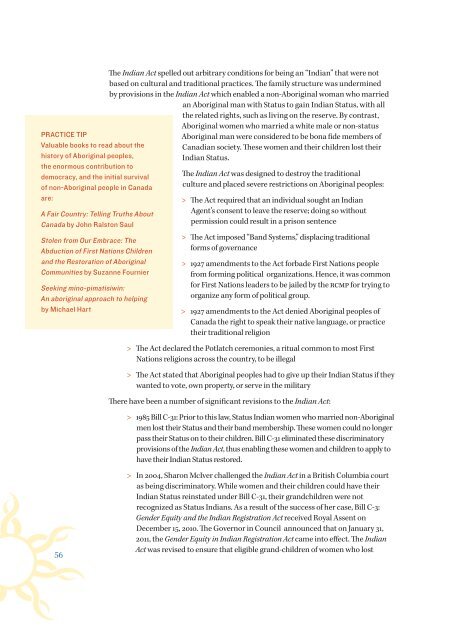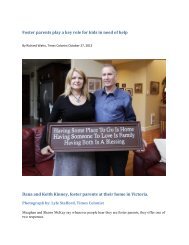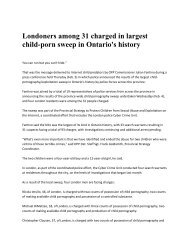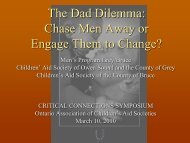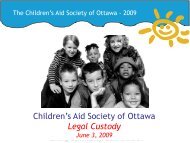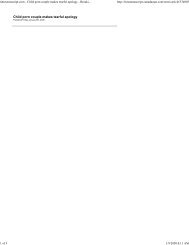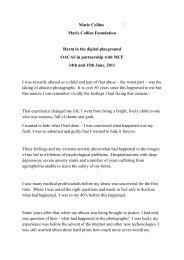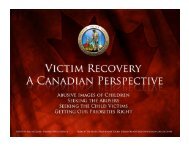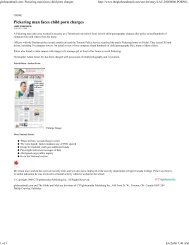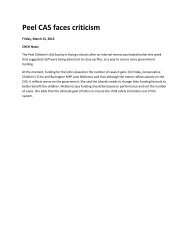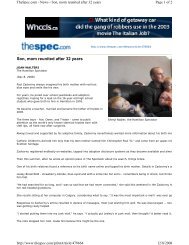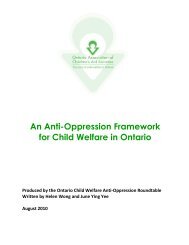English - Ontario Association of Children's Aid Societies
English - Ontario Association of Children's Aid Societies
English - Ontario Association of Children's Aid Societies
Create successful ePaper yourself
Turn your PDF publications into a flip-book with our unique Google optimized e-Paper software.
PRACTICE TIP<br />
Valuable books to read about the<br />
history <strong>of</strong> Aboriginal peoples,<br />
the enormous contribution to<br />
democracy, and the initial survival<br />
<strong>of</strong> non-Aboriginal people in Canada<br />
are:<br />
A Fair Country: Telling Truths About<br />
Canada by John Ralston Saul<br />
Stolen from Our Embrace: The<br />
Abduction <strong>of</strong> First Nations Children<br />
and the Restoration <strong>of</strong> Aboriginal<br />
Communities by Suzanne Fournier<br />
Seeking mino-pimatisiwin:<br />
An aboriginal approach to helping<br />
by Michael Hart<br />
56<br />
The Indian Act spelled out arbitrary conditions for being an “Indian” that were not<br />
based on cultural and traditional practices. The family structure was undermined<br />
by provisions in the Indian Act which enabled a non-Aboriginal woman who married<br />
an Aboriginal man with Status to gain Indian Status, with all<br />
the related rights, such as living on the reserve. By contrast,<br />
Aboriginal women who married a white male or non-status<br />
Aboriginal man were considered to be bona fide members <strong>of</strong><br />
Canadian society. These women and their children lost their<br />
Indian Status.<br />
The Indian Act was designed to destroy the traditional<br />
culture and placed severe restrictions on Aboriginal peoples:<br />
> The Act required that an individual sought an Indian<br />
Agent’s consent to leave the reserve; doing so without<br />
permission could result in a prison sentence<br />
> The Act imposed “Band Systems,” displacing traditional<br />
forms <strong>of</strong> governance<br />
> 1927 amendments to the Act forbade First Nations people<br />
from forming political organizations. Hence, it was common<br />
for First Nations leaders to be jailed by the RCMP for trying to<br />
organize any form <strong>of</strong> political group.<br />
> > 1927 amendments to the Act denied Aboriginal peoples <strong>of</strong><br />
Canada the right to speak their native language, or practice<br />
their traditional religion<br />
> > The Act declared the Potlatch ceremonies, a ritual common to most First<br />
Nations religions across the country, to be illegal<br />
> > The Act stated that Aboriginal peoples had to give up their Indian Status if they<br />
wanted to vote, own property, or serve in the military<br />
There have been a number <strong>of</strong> significant revisions to the Indian Act:<br />
> > 1985 Bill C-31: Prior to this law, Status Indian women who married non-Aboriginal<br />
men lost their Status and their band membership. These women could no longer<br />
pass their Status on to their children. Bill C-31 eliminated these discriminatory<br />
provisions <strong>of</strong> the Indian Act, thus enabling these women and children to apply to<br />
have their Indian Status restored.<br />
> > In 2004, Sharon McIver challenged the Indian Act in a British Columbia court<br />
as being discriminatory. While women and their children could have their<br />
Indian Status reinstated under Bill C-31, their grandchildren were not<br />
recognized as Status Indians. As a result <strong>of</strong> the success <strong>of</strong> her case, Bill C-3:<br />
Gender Equity and the Indian Registration Act received Royal Assent on<br />
December 15, 2010. The Governor in Council announced that on January 31,<br />
2011, the Gender Equity in Indian Registration Act came into effect. The Indian<br />
Act was revised to ensure that eligible grand-children <strong>of</strong> women who lost


